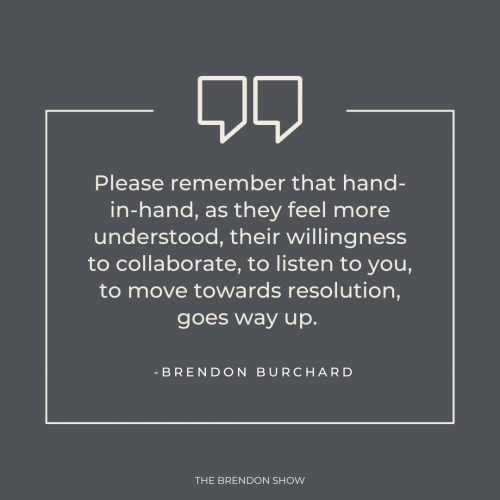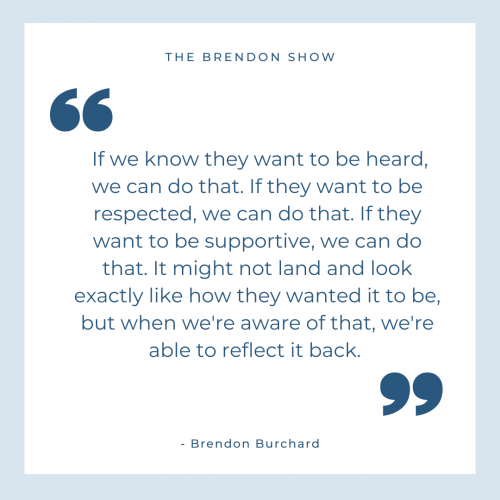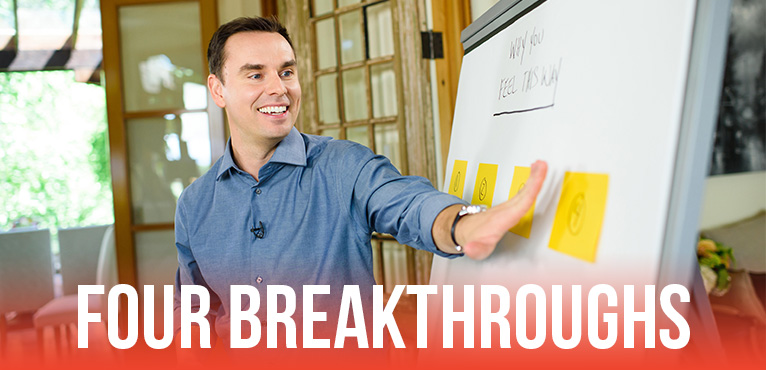SUMMARY
- “Soon as someone starts feeling more understood, you start moving better towards the resolution of the outcome.”
- Struggling with conflict in your relationships?. In this episode, learn how to work towards resolution and ending the conflict in a healthy, effective way.
- “Good listeners listen through the content for what’s important to them.”
- Would you like to improve your communication? In this episode, learn the powerful F.I.N.E. framework to discover how to listen and communicate with an incredible amount of effectiveness. This will ultimately allow you to quickly resolve conflict, avoid misunderstandings and make the people in your life feel heard, cared for, and understood.
- Watch the video to get the full training.
- Already have the High Performance Planner and CRUSHING each and every day? Let’s celebrate you! Take a photo with your planner and use #GrowthDay so we can find you on social media!
HOT NEWS & DEALS!
-
Get the Confidence Masterclass
Stop letting limiting beliefs and lack of confidence hold you back! Learn the SKILLS of confidence from 9 of the world’s best personal development experts in the most comprehensive Confidence training ever created! $400 worth of training – just $7.99 today! Get the Confidence Masterclass!
-
Get the GrowthDay app!
Make self-improvement a way of life and get the GrowthDay app! GrowthDay features all your personal development tools, coaching and community in one place. Write your journal, track your habits, take wellness challenges, watch live influencers teaching new life strategies, and join a global community of positive and supportive high achievers excited to improve their lives! Get the app on Apple app store here. Get on Android here. Get desktop here.
DID YOU KNOW?
I give weekly prizes, gratitude and shout-outs to our students, so post a screenshot or video on Instagram and use #TheBrendonShow! I can’t wait to hear your thoughts about this episode!
RELATED POSTS
3 Ways To Communicate More Mindfully
How To Become A Better Communicator
Tips For Developing Close Relationships



FULL TRANSCRIPT
[The following is the full transcript of this episode of The Brendon Show. Please note that this episode, like all TBS episodes, features Brendon speaking extemporaneously–he is unscripted and unedited. Filmed in one take, The Brendon Show has become one of the most viewed unscripted, direct-to-camera self-help series in the history of YouTube. It has also been the #1 Podcast in all of iTunes and is regularly in the top podcasts in the Self-Help and Health categories around the globe. Subscribe to the free motivational podcast on iTunes or Stitcher.)
1. Feelings
When you meet a master negotiator, a master coach, a master therapist, a master, you know, role model who really understands how to do communication well in conflict, what they’re doing is they’re reflecting, restating, and rephrasing things that the other person are bringing to them.
They’re reflecting, rephrasing or restating what other people said in order to demonstrate understanding.
Because we all know from our life’s experience, but also research, if the other person feels more understood – as soon as they start feeling more – watch this guys:
Soon as someone starts feeling more understood, you start moving better towards the resolution of the outcome.
It’s actually – they’ve done a really cool thing in communication where there’s a chart, you literally see it, the person reports feeling more understood, their move towards resolution, positivity, encouragement, ending the conflict moves up. It’s like, it’s like they go together hand in hand. But most people don’t know how to reflect because they don’t know what to listen for.
So, here’s an acronym for what to listen for. OK, I’m going to use the acronym of FINE. Like, I’m fine. I’m fine. OK, if you want the other person to feel fine, feel OK, feel safe in the conversation, FINE is our acronym today. F – I – N – E. FINE. What are you reflecting? You’re reflecting. And it’s usually in this order, but not always in this order. You’re reflecting F: which is feelings. Well, someone says, I’m so pissed at you. It’s as easy as saying, I hear that you’re pissed. If someone says, I’m so hurt that you did that. It’s saying, I know that you’re hurt. If someone says, you know, um, I’m so angry. I hear that you’re angry. It’s just reflecting back the feelings that they are stating to you. And I mean, literally use the expression, even if you don’t agree with it. Right? If they say, you’re being condescending to me. I hear that you feel I’m being condescending. It’s as simple as just reflecting the words right back. You don’t have to validate. You don’t even have to agree. It’s just hearing it. It’s restating it back to them. It’s reflecting it. It says, I’m listening to you. I heard the words that you chose to use. Right? And it’s reflecting back the feelings.
If they don’t – a lot of people don’t know how to access feelings. You know? Research shows most people only have access to like three to four words to describe their feelings. Happy, mad, sad and confused. Happy, mad, sad and confused. Most people don’t know how to say any other words than that. They have no emotional training. Right? I never did. I had, like, happy and mad. That’s all I grew up with. I was like, happy, mad. That was … that was … that was it. There was no nuance of all the other feelings that we could have. So most people, they might not know how to communicate it. And so if you’re sensing it, one way to reflect it is I’m, I’m sensing that you’re upset. Is that right? And it’s saying I sense it and asking to help you gauge the feeling. Or it’s just saying, I say to coaching clients all the time, especially now in this virtual world. I say it on Zoom. And as many of you guys know, my coaching clients paid $1,000,000 a year to work with me. So, I’ll look at them right on Zoom and say, you know what? Can we take a beat? I’m listening, but I can’t quite gauge you’re … through this virtual world. What is it – what it is you’re feeling, could you describe that to me? I know that sounds so, you know, junior varsity, but I literally say that to CEOs. I say that to Olympians. I say that to my friends, my partners, my spouse. I say it all the time. Hey, can we can we take a beat here? I’m not sure I’m picking up what it is you’re feeling. Can you can you describe what you’re feeling right now? I can’t tell. I say that all the time. And now I just open up the platform for them to express feelings. And that’s really important for a lot of people, especially if you’re dealing with somebody who doesn’t say what they feel or it’s hard to read it on their face to say, hey, can we take a beat a minute? I can’t tell what you’re feeling right now. That really can open up the door to better conversation. So, if you hear it or you sense it, try to gauge it or reflect it back.
2. Interests
So FINE. F – I – N – E. The I is interests. To reflect back their interests. So, here’s what this means: I learned this in mediation training and certification. This one really changed my life, said most people, they’re arguing about several pieces of content. Right? Several topics they’re arguing or they’re mad about, but often those topics can fit in one bucket. It’s an interest that they have, not an interest like curiosity interests. It means it is something that is important to them. So, if you don’t – if interests doesn’t translate in other languages sometimes, it’s something that is important to them. So, let me give an example and I know you’ve been there before, so let’s just take it right into your house, OK? Maybe you’re in conflict with your roommate or your spouse, your partner, the kids, and the conflict can sound like this: You left the pizza box out. You didn’t vacuum. You haven’t made your bed. And I’m sick and tired of it. And now it happens. The kid, the spouse, the partner. Well, they go: Yeah, but one time I made the bed and no, you know, I didn’t know how to use the vacuum or they – what do they do? They argue the content points of what you just said. When someone argues the content points of what you just said without acknowledging the interests, that just says they probably haven’t had training before. Because listen to what that is: Pizza box, vacuum, make the bed. Those are all interests. Those all go in a bucket of what? What’s the bucket you would label those content pieces? What’s the bucket called those go in? Well, the bucket says it’s important to me to have a clean house. They just didn’t know how to say that. It’s important for me to have a clean house and important to me to have support in making that happen. Important for me to know that you know that’s important to me and to help me out. It makes me feel safer, happier, more relaxed in my house when things have a little more order. But they don’t know how to say that.
So good listeners listen through the content for what’s important to them.
So instead of saying, well, I do clean sometimes, you go, you know, honey, I hear it’s important for you to have the house cleaner. Notice, I didn’t have to agree. I’m not talking about all the points. It’s just acknowledging the overall interest. If you really want to earn points, you’d say, honey, I hear that and I recognize it’s important for you to have a little more orderliness around the house and a little more help. Is that right? Is that what you’re saying? Is that right? Is that what you are saying? So, if you reflect back the perceived interest and then you say, is that right? Is that what you’re saying? Am I getting that right? And you stay open, what ends up happening is usually they say yes or they go, no, what I’m trying to say … And then they’ll share what’s really important. Most people have only learned to argue about the little points so they don’t how to make the big point. If you have them go to the big point called interests and have that conversation up there, most people can agree on the little things here we might fight about. So, let’s start up there. That makes sense to everybody? It’s interests versus just the content or the complaints. And soon as we can get there and we reflect back to that, now they feel heard and they feel heard at the macro, which makes them feel understood as a person. Not just heard or complied with at the micro, which even if they think they want that, they’ll appreciate this one more.
3. Needs
FINE. Feeling, interests, N is needs. Needs. Their needs. They will tell you their needs in almost every conflict. They will say it, but they won’t say it directly. They’ll usually drop breadcrumbs. They’ll usually hint at it. They won’t always say it, but there’s usually a need that they have. Those needs are usually like, I want to be heard and respected and supported. I want to be heard, respected and supported. Now, if we know they want to be heard, we can do that. If they want to be respected, we can do that. If they want to be supportive, we can do that. It might not land and look exactly like how they wanted it to be, but when we’re aware of that, we’re able to reflect it back.
And most people in long enough conflict, they will reveal their needs. I need you to clean up. I need you to hit 10% growth this month. I need you to do this. And they’ll say it to you. Often, what you need to learn to do is listen for the need, not the tone they expressed it in. This is where you truly get to another level of parenting or leadership. Listen through the tone. People suck at tone. They don’t know their tone, and you probably misinterpret their tone. And so human beings are actually pretty terrible at discerning tone, especially at nuance and so, it’s important for you to hear and reflect the need even – if your boss says, you’re supposed to grow this business by 10% this month and you haven’t. Well, most people go … they get defensive. I’ve been working my ass off. I’ve been in the office late. You know, you hired this new person who’s not helping me. They suck. And this thing happened and this happened in the marketplace. Don’t you understand? I’m doing my best here. And it’s just like, awful. But with the boss if you can listen, the boss was saying I needed to grow by 10%. You can reflect back that need and say, instead of getting defensive, say, I hear it’s really important to grow our company, the interest, and you need me in this team to deliver 10%. I hear that. That’s all. Just reflective. Just reflect it. We’re not solving yet. We’re just reflecting. You might write that down. We’re not even solving it. We’re just reflecting. This is, again, if you’re like, this just sounds … Brendon, I hate this process. Please remember that hand in hand, as they feel more understood, their willingness to collaborate, to listen to you, to move towards resolution goes way up. Literally, every degree that they feel more heard and understood, the more collaborative they become, the more amenable to other ideas they become, the more positive in their intent and their tone they become. It’s universal across every single culture.
As understanding goes up the willingness to negotiate, the willingness to calm down, the willingness to end the conflict sooner than later goes up. We got to hear them first.
4. Expectations
So, we’re still in reflection stage. Reflect feelings, interests, needs. F – I – N – E. Any feelings, interests and needs. And the final E that you might be listening for is the expectations they have for what should happen next. To reflect back to them their expectations for you, their expectations for the relationship, their expectations for the business. Usually, when they’re huffing and puffing at you, they’re dropping some expectations. I expect you to clean up that pizza box. I expect you to talk with your teammate. I expect you to do better next time. Again, you don’t have to agree, but you can reflect it. I, I’m hearing you: pizza box. I’m hearing you: talk to team. I’m hearing you: do this. All you got to do is acknowledge it.


